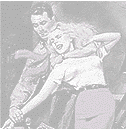But the Yiddish [of Un di velt, your early version of Night] continues: "Early the next day, Jewish boys ran off to Weimar to steal clothing and potatoes. And to rape German girls [un tsu fargvaldikn daytshe shikses]. The historical commandment of revenge was not fulfilled." In French this passage reads: "Le lendemain, quelques jeunes gens coururent � Weimar ramasser des pommes de terre et des habits � et coucher avec des filles. Mais de vengeance, pas trace." Or, in Stella Rodway's English rendition: "On the following morning, some of the young men went to Weimar to get some potatoes and clothes � and to sleep with girls. But of revenge, not a sign."
To describe the differences between these versions as a stylistic reworking is to miss the extent of what is suppressed in the French. Un di velt depicts a post-Holocaust landscape in which Jewish boys "run off" to steal provisions and rape German girls; Night extracts from this scene of lawless retribution a far more innocent picture of the aftermath of the war, with young men going off to the nearest city to look for clothes and sex. In the Yiddish, the survivors are explicitly described as Jews and their victims (or intended victims) as German; in the French, they are just young men and women. The narrator of both versions decries the Jewish failure to take revenge against the Germans, but this failure means something different when it is emblematized, as it is in Yiddish, with the rape of German women. The implication, in the Yiddish, is that rape is a frivolous dereliction of the obligation to fulfill the "historical commandment of revenge"; presumably fulfillment of this obligation would involve a concerted and public act of retribution with a clearly defined target. Un di velt does not spell out what form this retribution might take, only that it is sanctioned � even commanded � by Jewish history and tradition. (Naomi Seidman, Elie Wiesel and the Scandal of Jewish rage, Jewish Social Studies: History, Culture, and Society, Fall 1996, Volume 3, Number 1, p. 6)
|

